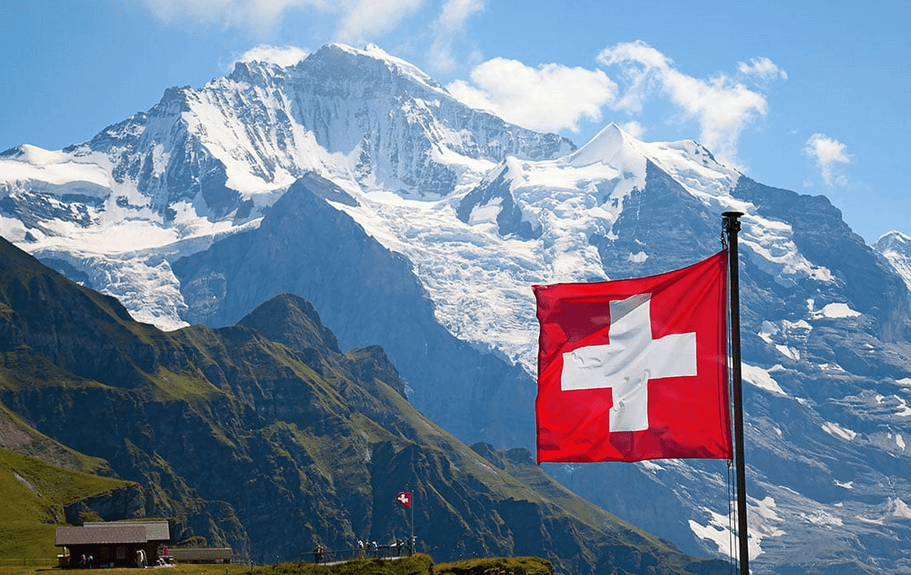📑Table of Contents:
- The Swiss Alps
- Swiss Watches: Precision and Luxury
- Swiss Chocolate: A Global Delight
- Swiss Cheese: Tradition and Flavor
- Banking and Finance: Switzerland as a Global Financial Hub
- Swiss Neutrality: A Pillar of Diplomacy
- Swiss Innovation and Technology
- Cultural Richness and Diversity
- Swiss Cuisine: A Blend of Tradition and Innovation
- Swiss Festivals and Events
- The Charm of Swiss Cities
Switzerland, a small yet influential country in the heart of Europe, captivates with its picturesque landscapes, rich history, and global significance. Despite its modest size, Switzerland holds a unique position on the world stage, thanks to its cultural, economic, and political contributions. From the towering peaks of the Swiss Alps to its reputation as a global hub for finance and diplomacy, Switzerland is a nation that offers something for everyone. This comprehensive exploration delves into what Switzerland is known for.

The Swiss Alps
The Swiss Alps are perhaps the most iconic symbol of Switzerland, representing both its natural beauty and its status as a premier destination for outdoor enthusiasts. Stretching across the southern part of the country, the Alps offer some of the most stunning and diverse landscapes in the world. The Matterhorn, one of the most recognizable peaks globally, is a beacon for adventurers and photographers alike. Standing at 4,478 meters (14,692 feet), the Matterhorn is a challenging yet rewarding climb, attracting mountaineers from all over the world.
Besides the Matterhorn, the Swiss Alps feature peaks like the Eiger, Jungfrau, and Mont Blanc, often linked with Switzerland despite being on the French border. These mountains offer a wide range of activities, from skiing and snowboarding in winter to hiking and paragliding in summer. The region’s scenic train routes, like the Glacier Express and Bernina Express, offer breathtaking views of mountains, valleys, and lakes.
Switzerland’s commitment to preserving its natural environment is evident in the numerous national parks and nature reserves scattered throughout the Alps. The country’s emphasis on sustainable tourism ensures that the natural beauty of the Alps remains unspoiled for future generations.
Swiss Watches: Precision and Luxury
When people think of Switzerland, one of the first things that comes to mind is its unparalleled reputation in watchmaking. Swiss watches are synonymous with precision, craftsmanship, and luxury. The tradition of Swiss watchmaking dates back to the 16th century when Protestant reformer Jean Calvin banned the wearing of jewelry in Geneva. As a result, goldsmiths and jewelers turned to watchmaking, setting the stage for Switzerland’s dominance in the industry.
Over the centuries, Swiss watchmakers have perfected the art of horology, leading to the creation of some of the most prestigious watch brands in the world. Companies like Rolex, Patek Philippe, Omega, and Audemars Piguet have become household names, representing the pinnacle of watchmaking excellence. These brands gain recognition for their meticulous attention to detail, innovative designs, and high-quality materials.
Swiss watches are not just about telling time; they are a symbol of status, heritage, and engineering marvels. The Swiss watch industry plays a vital role in the country’s economy, with exports amounting to billions of dollars annually. Switzerland cements its leadership in horology with events like Baselworld, a key trade show for the global watch and jewelry industry.
Swiss Chocolate: A Global Delight
Switzerland is a paradise for chocolate lovers. The country is famed for producing some of the finest chocolates in the world, a tradition that dates back to the 19th century. Swiss chocolatiers craft chocolate with a smooth texture, rich flavor, and high-quality ingredients. The country’s cool climate and access to high-quality milk from its alpine pastures make it an ideal location for chocolate production.
The Swiss invented milk chocolate in 1875 (Daniel Peter) and developed the conching process (Rodolphe Lindt) for a smooth texture. Today, Switzerland is home to some of the most famous chocolate brands, including Lindt, Toblerone, and Cailler.
Swiss chocolate is not just a treat for the taste buds; it’s also an important export product. The country exports vast quantities of chocolate each year, with Swiss chocolate being a favorite in many countries around the world. Whether enjoyed as a simple chocolate bar or in the form of elaborate truffles, Swiss chocolate is a symbol of indulgence and quality.
Swiss Cheese: Tradition and Flavor
Switzerland’s cheese-making tradition is as rich and varied as its landscapes. Swiss cheese is also famous for its distinct flavors, textures, and the traditional methods used in its production. The most iconic Swiss cheese is Emmental, often recognized by its characteristic holes. Moreover, emmental, produced in Switzerland’s Emmental region, offers a mild, nutty flavor.
People often use Gruyère, another well-known Swiss cheese, in dishes like fondue and raclette. Gruyère has a slightly sweet, nutty flavor that becomes more complex with aging. Raclette, a traditional Swiss cheese, melts over boiled potatoes, pickles, and onions, making it popular in winter.
Swiss cheese-making relies on tradition, with many cheeses produced using centuries-old methods. The country’s diverse climates and regions contribute to the wide variety of cheeses, each with its unique characteristics. Thus, Switzerland’s commitment to quality and tradition in cheese-making has made its cheeses some of the most sought after in the world.
Banking and Finance: Switzerland as a Global Financial Hub

Switzerland’s banking and finance sector is renowned worldwide for its stability, security, and confidentiality. The country’s reputation as a global financial hub dates back to the early 20th century, when it began to attract wealthy individuals seeking a safe place to store their assets. Switzerland’s strict banking secrecy laws and political neutrality made it an ideal location for international banking.
Today, Switzerland is home to some of the world’s largest and most prestigious banks, including UBS and Credit Suisse. The Swiss financial sector plays a crucial role in the global economy, offering services such as wealth management, investment banking, and insurance. Thus, the country’s financial institutions handle complex international transactions and manage large-scale investments with expertise.
In addition to banking, Switzerland is also a major player in the insurance industry, with companies like Zurich Insurance Group and Swiss Re among the leading providers of insurance and reinsurance services globally. The country’s financial stability and reputation for integrity have made it a preferred destination for individuals and corporations seeking a secure and reliable financial environment.
Swiss Neutrality: A Pillar of Diplomacy
Furthermore, Switzerland’s long-standing tradition of neutrality is one of its most defining characteristics. The country has maintained a policy of neutrality since the early 19th century, allowing it to avoid involvement in international conflicts and wars. This neutrality has enabled Switzerland to serve as a mediator in numerous global disputes and to host international organizations and negotiations.
Geneva, one of Switzerland’s major cities, is home to the United Nations Office at Geneva, the International Committee of the Red Cross (ICRC), and numerous other international organizations. Switzerland’s commitment to neutrality and diplomacy has also earned it a reputation as a trusted and impartial mediator in global affairs.
Switzerland’s neutrality also extends to its humanitarian efforts. The country demonstrates its commitment by providing aid and support to those affected by conflicts and disasters worldwide. The ICRC, headquartered in Geneva, plays a vital role in protecting victims of armed conflicts and providing humanitarian assistance in some of the world’s most challenging environments.
Swiss Innovation and Technology
Furthermore, Switzerland consistently ranks among the most innovative countries in the world, thanks to its strong emphasis on research and development, education, and technological advancement. The country is home to some of the world’s leading universities and research institutions, including ETH Zurich and EPFL, which are at the forefront of scientific and technological research.
Switzerland’s innovation extends to various industries, including pharmaceuticals, biotechnology, engineering, and information technology. Companies like Novartis, Roche, and ABB are global leaders in their respective fields, contributing significantly to advancements in healthcare, automation, and sustainable technologies.
The Swiss government’s support for innovation, coupled with a highly educated workforce and a strong intellectual property protection system, has created an environment conducive to technological advancement. Thus, this commitment to innovation has positioned Switzerland as a leader in the global knowledge economy.
Cultural Richness and Diversity
Despite its small size, Switzerland also boasts a rich and diverse cultural heritage. The country has four official languages—German, French, Italian, and Romansh—reflecting its multicultural population. Each language region has its own distinct traditions, customs, and cuisine, making Switzerland a true melting pot of cultures.
Swiss cities like Zurich, Geneva, and Lausanne are cultural hubs, offering a wide range of museums, galleries, theaters, and music festivals. Zurich, the largest city, boasts a vibrant arts scene with numerous art galleries, theaters, and music venues. The city’s annual Zurich Film Festival attracts filmmakers and movie enthusiasts from around the world.
Geneva, known as the “City of Peace,” is both a diplomacy hub and a cultural hotspot. The city is home to the Grand Théâtre de Genève, one of Europe’s leading opera houses, and the International Red Cross and also the Red Crescent Museum, which offers a unique perspective on humanitarian efforts.
Lausanne, on Lake Geneva’s shores, is known for its Olympic Museum and vibrant nightlife. The city hosts the Montreux Jazz Festival, a prestigious event attracting top artists and music lovers worldwide.
Switzerland showcases its dedication to heritage through UNESCO sites like the Old City of Bern and Lavaux Vineyard Terraces. Thus, these sites offer a glimpse into Switzerland’s rich history and cultural diversity.
Swiss Cuisine: A Blend of Tradition and Innovation

Swiss cuisine is as diverse as its culture, with each region offering its own unique culinary traditions. Switzerland’s cuisine is influenced by Germany, France, and Italy, creating a rich mix of flavors and dishes.
Fondue, a famous Swiss dish, is melted cheese served with bread for dipping. Raclette, another traditional dish, involves melting cheese and scraping it over potatoes, pickles, and onions. Both dishes are popular in the winter months and are often enjoyed in a cozy chalet setting.
Rösti, a potato dish that originated in the German-speaking part of Switzerland, is another national favorite. Made from grated potatoes, Rösti is often served as a side dish with sausages, eggs, or cheese. In the French-speaking region, dishes like quiche and tartiflette, a potato and cheese dish, are popular.
Switzerland is known for its fine dining and innovative culinary scene, with Michelin-starred restaurants offering modern takes on traditional Swiss dishes. Switzerland’s commitment to quality and innovation in food is evident in its gourmet products, like artisanal cheeses and handcrafted chocolates.
Swiss Festivals and Events
Switzerland hosts festivals year-round, celebrating its traditional heritage and modern culture. One of the most famous festivals is Fasnacht, Switzerland’s Carnival, celebrated in Basel, Lucerne, and Zurich. Fasnacht is a vibrant event with elaborate costumes, masks, and parades, celebrating winter’s end and spring’s start.
The Montreux Jazz Festival, on Lake Geneva’s shores, is one of the world’s most prestigious music festivals. The festival draws top jazz, rock, and pop artists, blending music, culture, and stunning scenery.
In addition to music festivals, Switzerland is known for its film festivals, such as the Zurich and Locarno Film Festivals. These events also attract filmmakers, actors, and cinephiles from around the world, showcasing the best in international and Swiss cinema.
Swiss National Day, celebrated on August 1st, is another important event in the country’s calendar. The day features fireworks, parades, and Swiss music and dance, with celebrations across towns and cities nationwide. The event also offers a chance for the Swiss people to come together and celebrate their national identity and heritage.
The Charm of Swiss Cities
Switzerland’s cities offer a perfect blend of modernity and tradition, each with its unique character and charm. Zurich, Switzerland’s largest city, is a global financial hub known for its quality of life, arts, and lake views. The city is home to numerous museums, art galleries, and theaters, as well as a bustling nightlife.
Geneva, known as the “Capital of Peace,” hosts the UN Office and many other international organizations. The city’s lakeside setting, rich history, and cultural diversity make it popular with tourists and diplomats alike.
Searching “what is Switzerland known for,” you’ll find Bern, the capital, is a UNESCO site with well-preserved medieval architecture. The city’s cobbled streets, historic buildings, and bridges over the River Aare create a timeless, nostalgic atmosphere.
Lausanne, on Lake Geneva, is known for its vibrant culture and as the Olympic capital with the IOC headquarters. The city’s hilly terrain offers stunning views of the lake and the surrounding Alps, making it a popular destination for both cultural and outdoor activities.
Basel, situated on the Rhine River, is Switzerland’s cultural capital, with numerous museums, art galleries, and theaters. The city is famous for its vibrant Fasnacht carnival and historic old town with medieval buildings and cobblestone streets.

Final Thoughts!
Switzerland is a country that captivates with its natural beauty, cultural richness, and global influence. From the Alps’ peaks to precise watches, Switzerland is renowned for excellence in various fields. Its commitment to neutrality, innovation, and quality has made it a respected and admired nation worldwide.
Whether you’re exploring its scenic landscapes, indulging in its culinary delights, or delving into its rich history, Switzerland leaves a lasting impression on all who visit.
Switzerland’s blend of tradition, modernity, and commitment to excellence ensures it remains a global leader and cherished destination.





